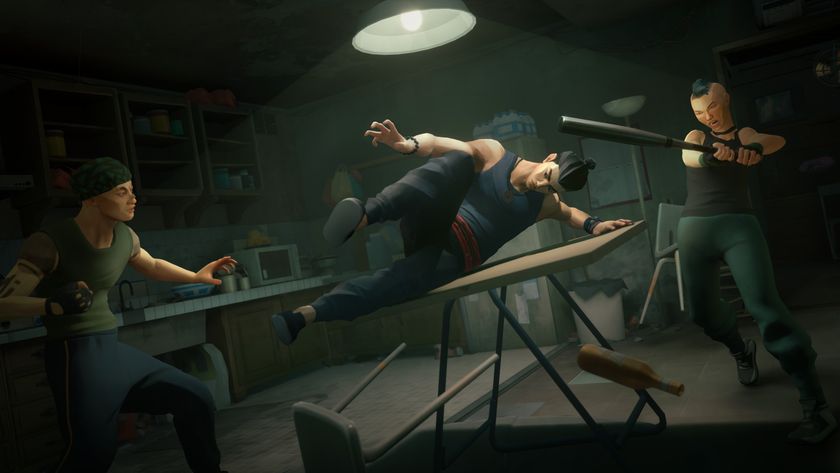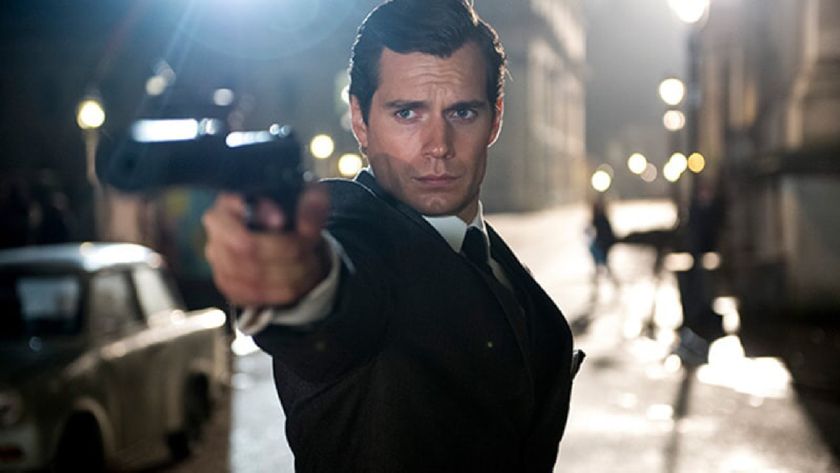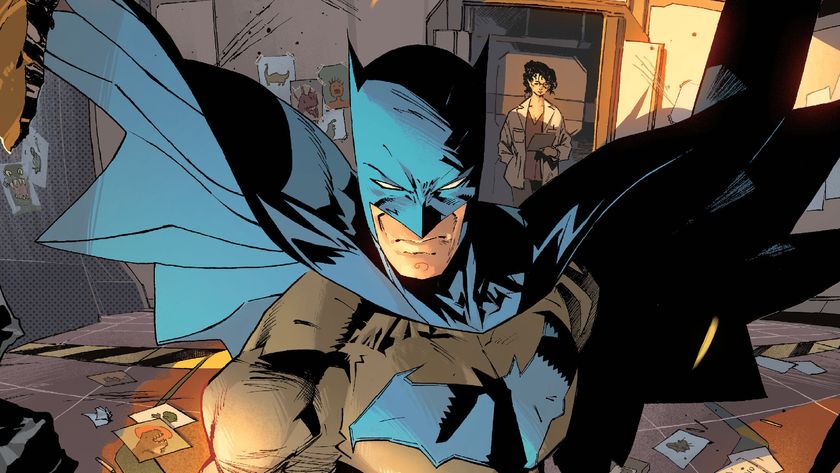TF versus the Die Hard 4.0 villains, Maggie Q and Timothy Olyphant
We face-off against the not-so gruesome twosome...
Were you a fan of the Die Hard films going into this, or did you have to have a bit of a catch-up?
Maggie: No, luckily I didn’t. Americans are kind of obsessed with it. This character in this movie is quite the American icon, the ordinary hero guy that they love. You know this series by default, being American, you know the series. I had a brother, so I was definitely very educated in the action genre.
How did it feel to play a Die Hard villain, you’re in some pretty good company…
Maggie: Quite! Too good! The thing that attracted me most was that there hadn't been a female in this position in the series, and it was something that Bruce was into and Len was into. It seemed that I had the support of everyone. That’s nice going into something, ‘cause you could easily be wary and not sure if it would work or not, but everyone was very excited and for me that was exciting, because of everyone’s energy.
Did you enjoy playing the villain?
Maggie: I find so much more freedom in it. When you play the good guy you have to dot your Is and cross your Ts and make sure that your image remains as such. When you’re bad you’re just bad, you can take it wherever you want to – there’s definitely isn’t more rules put on your as a bad guy, so it’s nice.
Timothy: Because they are nuts almost any behaviour is justified, and that kind of takes the pressure off. But one thing I must say, this movie, I just enjoyed being a part of it. When they told me they were looking for a villain for Die Hard, my knee-jerk response was ‘Cool! They’re making another Die Hard!’ And my second response was, ‘And I can be in it!’ It seemed like fun.
Maggie, meeting you now, you seem lovely – but in the film, there’s a lot of darkness, what did you tap into?
Sign up for the Total Film Newsletter
Bringing all the latest movie news, features, and reviews to your inbox
Maggie: This script and this story is very current, very contemporary, and something that when I initially read the entire script, the whole theme of it I thought was important. I think there are a lot of people who are angry right now about certain decisions being made by certain countries and what we’re getting involved with and what we’re not. Anger can come easily if you’re going to discuss things like that, so a little of that was going on in my mind doing this movie.
It’s a very patriotic movie, but there’s one moment for me, when for the first time in a Die Hard film you’re almost not sure who’s the villain…
Maggie: Thank you. Thank you so much, you’ve made my day. Depending on how you feel about the current situation, we could either be good or bad – mind you, my character’s disappointment in the film is that my partner in life and crime takes it a little too far and innocent people get killed, but she absolutely believes in that, and in their minds, they’re not bad because they’re angry, they don’t like the situation in America right now.
Timothy, how do you feel about that…
Timothy: I’m glad you think so, I think one of the challenges of the job was to humanise the character. He’s not as accessible as the villains in the past Die Hards – especially the first one, where it really felt like a two-hander between Alan Rickman and Bruce, those two guys dominated the movie. In some ways, in this one, it really is a small part, just in terms of the amount of screentime the villain has – he’s really not in there. And when he is in there, especially in the early part, it’s really just‘roll stage two, and get that guy on the phone’ he’s a very inaccessible character.
Also, in the other films, those guys were essentially thieves; with this guy the challenge of it also was, this guy’s a terrorist, he sees himself as a hero, from his own perspective. So one of the things Bruce and I talked about first day on the job, and Len and I talked about, was where are those moments where I can play him as the hero of the film, where can we see some human qualities and vulnerabilities, and maybe by doing that, we might open up a little bit of why he’s so unstable. Sometimes when you play the villain in a human way, he seems even more crazy than if you’d twirled your moustache.
How was all the physical stuff for you….
Maggie: Awesome. It’s like boys with toys and I said that to the crew as well, when they were rigging all these cars up and they were doing it when they were young, but now they’re doing it as adults and they’re life-size cars. It’s kind of like me, I get to play in these expensive playgrounds paid for by Fox, care of Bruce Willis! When I first sat down with Len Wiseman, they were very different to any other action scene that I’d seen in any other action movie, just because it was so innovative and I loved the danger of it all – and it was equally exciting to shoot.
Timothy, were you disappointed that you didn’t get to do as much physical stuff as the other guys?
I don’t know about being disappointed, part of the appeal of the job was that it was a relatively easy, in-and-out gig (laughs). I sort of showed up every couple of days and I was done. It only took me a couple of days to be the Die Hard villain, that was kind of cool.
Now, this franchise is Bruce Willis…
Maggie: (Laughs) I love that…
D’you know what I mean?
Maggie: Oh yes , oh yes.
Timothy: I’m pretty clear on that.
Did he ever step in and give you any advice, or was he hands off?
Maggie: No, he’s an advice giver for sure – certainly if you need something, he’ll go the extra mile if you need something. He’s the reason this franchise is as successful as it is, period, so he definitely has room to say: ‘Well, I think this works or this doesn’t.’ Especially with our fight, you have Bruce who’s been doing this franchise for 22 years or whatever it is, and myself who’s new to it, so you have his style and my style, merging and trying to marry these two very very different people.
So there certainly were a lot of moments when we had to sit down and say ‘Well, that’s you and that’s me, how can we make this work so it’s totally believable, but also so you’re staying true to your character that’s been around for however long, and I’m bringing something new without stepping on that?’ So, lots of discussions on this movie, because when you’re doing a franchise there’s a certain amount of pressure there for sure.
Timothy: He is involved in everything, and in a great way. He’s the guy that holds the keys to this puppy. His involvement in everything was received positively by everybody – he’s very smart, Bruce. He’s got a very good eye. I really feel that he could be the next Clint Eastwood, I wouldn’t be surprised if he went on and had a career in directing. He has a good eye for things, whether it’s the other actors and the performances or not. When you’re on the set, you know it’s his baby.
When he asked me what I was planning on doing, I was kind of flattered, because part of me thought ‘I’m going to do whatever you want me to do – it’s your baby, I don’t want to fuck it up, you tell me what you want me to do.’ I thought it was amazing how generous he was, really allowing people to do their job, but at the same time remaining very much involved – it was a really nice collaboration.
Maggie, do you wish you’d have had some scenes with Kevin Smith, I hear he’s really fun to work with?
Maggie: There were wonderful days when we were all working, Justin, Kevin, myself, Bruce – so he absolutely brought a lot of sunshine into our lives, I think we were halfway through filming when Kevin came in to film for a little bit. And he’s just so brilliant, he’s a director, and I think he really comforted Len.
This is a very hard movie for Len Wiseman – this is huge for him, and with a big movie comes a lot of responsibility, and it was very stressful for him, and I think Kevin coming along as an actor / director, really gave him some comfort. He’d say ‘Hey man, you’re really doing a great job, this is a very hard movie to do.’ He kind of did that for all of us, we’re all so in love with Kevin. When we first saw the movie, it was with Kevin – it was me, Justin and Kevin – we totally idolise him, he’s such an icon.
It sounds like you, he and Justin were a little gang, was Justin fun on set?
Maggie: Too much fun, so ridiculous. Actually by far my favourite person, in the world. Justin and I have a very similar sense of humour and we had similar situations where we were the two younger people onset, so we leant on each other.
You're a couple in the film, but you don't have a great deal of screentime; did you come up with a back-story for your characters?
Timothy: The relationship was something that – as I recall – was something that Len and I talked about more. I just felt like, ‘Check her out – shouldn’t she be my girlfriend? Look around the van – it seems like an obvious choice!’ (laughs). Once we had established that relationship, it allowed us to go to a place of vulnerability...
Maggie, you’re not a typical cyber-geek, do you use the ‘net much?
Maggie: I am a big animal rights person – huge, so when I'm on the internet I’m certainly not on it for entertainment, more for information. I research a lot because I do a lot of interviews, and I’m kind of an activist in Asia. I’ll hopefully be doing a lot more of that in the States when I’m more well known. For me, I’m on Peta sites a lot, animal informative sites, stuff that’ll help me with my research. That’s about it! Check my email and I’m off. I’d rather take a walk than be on a computer – I’m so old fashioned.
The Total Film team are made up of the finest minds in all of film journalism. They are: Editor Jane Crowther, Deputy Editor Matt Maytum, Reviews Ed Matthew Leyland, News Editor Jordan Farley, and Online Editor Emily Murray. Expect exclusive news, reviews, features, and more from the team behind the smarter movie magazine.
Most Popular








